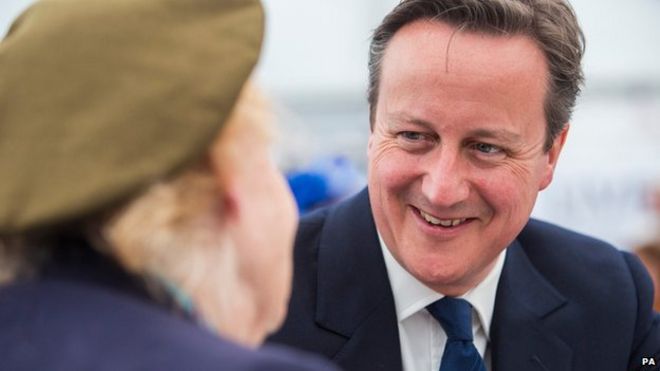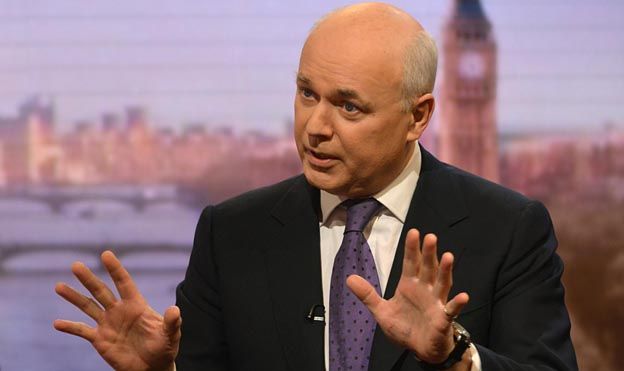- 27 minutes ago
- Election 2015

David Cameron will address Conservative backbenchers for the first time since winning a majority on Monday, as he continues to appoint his new cabinet.
He retains Iain Duncan Smith as Work and Pensions Secretary, while Baroness Stowell remains leader of the Lords.
The PM revealed he has already spoken to European leaders about renegotiating Britain's relationship with the EU, ahead of his planned in/out referendum.
A senior backbencher said ministers should be free to back a UK exit.
Graham Brady, who chairs the 1922 Committee, said Mr Cameron should allow "freedom of expression" to avoid tension within the party.
In other election news:
- The Parliamentary Labour Party will meet, as backbencher Dan Jarvis rules himself out of the leadership race
- UKIP's national executive committee will decide who will be interim leader of the party
- George Galloway says he has launched legal proceedings to challenge the result of the Bradford West election
The Conservatives won a 12-seat majority in the House of Commons in Thursday's election, taking 331 of the 650 seats. You can see the full results here.
As MPs return to Westminster, Mr Cameron will pledge to ensure the "economic recovery reaches all parts of our country".

Mr Cameron will tell the 1922 Committee his first term was "about repair and recovery", saying it fell to his party to put the economy back on track after "the great Labour recession", and that the next term is about renewal.
"It will be our task to renew a sense of fairness in our society - where those who work hard and do the right thing are able to get on," he will say.
The prime minister will address the committee on plans to renew the UK's relationship with Europe and show "respect" for all parts of the Union.
Mr Cameron told Channel 4 News on Sunday he had already called some European leaders ahead of efforts to renegotiate Britain's terms of membership of the EU.
"The first thing is to get the renegotiation going," he said.
"And we'll be doing that very soon, getting on with that. I've already made some calls to European leaders. The renegotiation first, then the referendum before the end of 2017."
However, any efforts to address concerns over high levels of immigration and the effect on the UK labour market could prove a sticking point. Ministers from Poland, Hungary and Slovakia have told the Financial Times they are not prepared to give up on the principle of freedom of movement for their citizens.
EU rules mean everyone can move to live - and in most cases have the right to work - in any member state. Mr Cameron had told last year's Conservative conference: "I will go to Brussels, I will not take no for an answer and - when it comes to free movement - I will get what Britain needs."
'Strong belief'
In the first salvo over the EU referendum, which Mr Cameron has pledged to hold by the end of 2017, Mr Brady said not allowing ministers to campaign against continued membership could lead to tensions.
"Where you have people who have very, very strong beliefs about something, it is far better to recognise the strength of those views and to allow latitude and freedom of expression," he told BBC Radio 4's Westminster Hour.
"The more you try to constrain people's views, to limit debate, the more you create tensions which needn't necessarily be there."
He said both the Conservatives and Labour would have members on either side of the debate, adding: "The more you recognise that and accommodate it, the less it appears to be a great rancorous split and the more it is just a civilised intelligent debate among people who all have the best interests of the country at heart."

Analysis: Political correspondent Chris Mason
The debate within the Conservative Party and beyond it about our place in Europe - inside the EU or outside - will be a staple of British politics for the next few years.
The fact that the sentence you have just read is true will warm the hearts of Conservatives: proof they pulled off a victory many thought unlikely, proof their desire to offer us, the electorate, a say on Europe will happen.
But managing that debate, inside and outside the party, and ensuring it doesn't become all-consuming and drown out what else the government is up to, will be David Cameron's big challenge.
Expect his backbenchers to be pretty emollient early on, still on the high that victory has brought.
Graham Brady's tone was exactly that - but his choice of language was also an insight into how that might change.

'Vital reforms'
Ahead of Monday's reshuffle, it has already been announced Michael Gove will be the new justice secretary and Mark Harper the chief whip in Mr Cameron's cabinet.
Nicky Morgan will remain as education secretary and minister for equalities.
The other ministers confirmed as staying in their current posts are Chancellor George Osborne, Home Secretary Theresa May, Foreign Secretary Philip Hammond and Defence Secretary Michael Fallon.
Mr Duncan Smith said it had been a "privilege" to be part of the government.
He added: "I am delighted to have the opportunity to complete the vital welfare reforms that have already helped so many people back into work.
"The completion of Universal Credit will ensure work always pays, and will improve the incomes of those on low salaries."

No comments:
Post a Comment